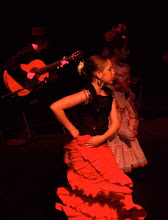Merriam Webster tells us that comedy is “an amusing event or happening.” It also defines tragedy as a “very sad or terrible event or happening.” Why do these sad and terrible events make us laugh? Something we would cry about if it happened in real life can make us laugh if we see it on the stage. Tragedy and comedy are clearly closely linked; a whole style of theatre has been invented to mix violence and comedy (slapstick). Pain and sadness make us laugh when it happens to others. How does Shakespeare, who was famous for both heart-wrenching tragedies and heart-warming comedies, get us to laugh at the awful situations faced in his most comic play, A Comedy of Errors?
It is not a modern idea to blend tragedy and comedy to create something hilarious. Since before the time of Shakespeare, entertainers have realized the human weakness for awful situations – as long as, of course, they’re happening to others. Why do such terrible experiences cause such hilarity? Partly, I think, the emotions of happiness and sadness are such exaggerated feelings anyways, the extra over exaggeration of the stage or a particularly dramatic event makes a normally serious happening just a bit too serious for a real tragedy. Sometimes, for real life occurrences, the opposite is true- people do not realize the extent of the damage and think some peoples’ reactions are over exaggerated, making them laugh. Oftentimes, people laugh merely out of nervousness. That nervous laughter would make perfect sense in a scary situation and could be misunderstood by both the laugher (and surrounding people) as amusement. Also, sad events in reality can be made hilarious through dramatic irony – everybody loves knowing things someone else does not. When the audience can see right through a bad situation when the characters have no idea what’s going on, they feel smart. It is funny to see people blunder around stupidly when you know the solution to their problems. This is shown throughout the play A Comedy of Errors as the sets of twins keep being mixed up. Another reason these things make us laugh is that it’s just part of the human nature – it seems as though the human race has an awful obsession with violence, sadness, and evil. Why else would terror, horrors, mysteries, and tragedies intrigue us so?
So, what are some similarities between these seemingly bipolar topics of tragedy and comedy? Both of them are dramatic emotions, of course, and both of them are exaggerated by the stage. As I already mentioned, over exaggerated emotions add hilarity to a situation. The fine line between tragedy and comedy often seems to vanish when a tragic scene in the theatre is paired with humorous dialogue, as shown in A Comedy of Errors in the scene where Antipholus and Dromio are examined by Dr. Pinch. Accusations of madness are no laughing matter normally, but the audience exploded with laughter as the scene progressed. We were removed from the situation, obviously, which made it a minor incident in our lives, nothing more than an entertainment for the afternoon. If the audience had stopped to consider exactly what they were chuckling at, they may not have laughed so uproariously. People want to laugh; the theatre, television, and other entertainment forms are meant as a release from life. Even if something would seem sad in the world today, humans will make something funny for their own sakes – they need some humor in their lives.
Shakespeare was an expert at using the human nature to his advantage. He knew many ways to convince an audience that a scene was comic- knowing the scenario had no basis in reality, for one. If they thought it was real, then the play may have no effect but sorrow on Shakespeare’s paying costumers. William Shakespeare also often hurts the characters he has first made the audience despise – the villain. No one cares much about the wicked characters unless they are given their just desert. The audience may also feel superior to an unlucky character, and we all love feeling important, even if it comes at the cost of another’s dignity. The adrenaline and excitement of a situation can also end in hilarity, just as a nervous situation can end in laughter.
Comedy and tragedy are often closely linked, and William Shakespeare had a talent for writing tragicomedies. The same responses can be given to both a tragic scene on the stage and a comic one. I regularly see occurrences where a sad situation can bring out feelings of amusement in people removed from the situation. One time I have experienced this is when I was merely in second grade. I had recently received a pallet expander, and it significantly inhibited my speech, leaving me nearly incomprehensible. I could hardly chew, and I definitely felt far from euphoric. In fact, I was feeling very depressed and despondent. My homeroom class and teacher did nothing to improve my mood; when I reached my classroom, everyone burst out laughing and began to imitate me. I saw nothing humorous in the situation, but apparently, everyone else did. Personally, I have never liked slapstick, violence, or other people’s sorrows, but that just shows how tastes can vary, I suppose. I have always wondered- if the human race finds it so easy to laugh at the misfortunes of others, what does that tell us about our society?
Subscribe to:
Post Comments (Atom)

No comments:
Post a Comment